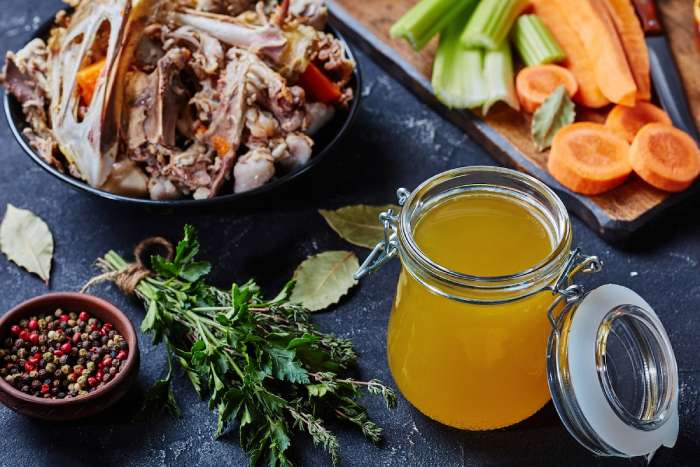You may have heard of bone broth being touted as a healthy human food, but did you know that bone broth is also good for dogs?
Studies have shown that bone broth can provide numerous health benefits for dogs, including enhanced joint health and improved digestion. In this article, we’ll discuss the benefits, risks, types of broth, preparation, and serving options for this nutritious canine treat.
How Bone Broth Can Enhance Your Dog’s Health?
Enjoying the benefits of bone broth can help keep your pup healthy. Bone broth is rich in vitamins, minerals, and amino acids, which can provide numerous health benefits for your dog.
For instance, it can help boost your pup’s digestive health by providing key nutrients that aid in digestion. It can also support your canine’s immune system by providing essential vitamins and minerals to maintain a strong immune system.
Bone broth is also highly palatable and nutritious, making it a great addition to your dog’s meals. With its high nutrient content, bone broth can provide your pup with the essential vitamins, minerals, and amino acids for optimal health and wellness.
Risks- Potential Concerns and Considerations:
While it can offer numerous benefits, it is important to know the risks associated with giving your pup bone broth. Overcooking the broth can cause the bones to release too much calcium, leading to various health issues. Additionally, bone broth can cause an allergic reaction in some dogs, and it is important to look out for signs such as rashes, vomiting, and diarrhea.
| Risk | Description | Preventative Measure |
|---|---|---|
| Overcooking | Too much calcium released | Don’t overcook the broth |
| Allergic reaction | Rashes, vomiting, diarrhea | Monitor for any symptoms |
Types of Broth: Varieties for Your Canine Companion

There are several types of bone broth that you can offer your pup. Most pet owners prefer to buy pre-made broths from pet stores, but there are also bone broth alternatives that can be made at home. Generally, the pre-made broth is made with beef, chicken, or fish bones that have been boiled with vegetables and herbs.
Home-made recipes usually include beef, chicken, or fish bones that have been boiled with vegetables, herbs, and often some type of grain. Both types of broth offer your pup the benefits of a nutrient-rich liquid that can help soothe an upset stomach, supply extra moisture, and add flavor to food.
Bone broth is an excellent addition to your pup’s diet and is a great way to provide your dog with wholesome nutrition.
Preparation: Making Safe and Nutritious Bone Broth for Dogs

To enjoy the benefits of bone broth, it’s important to prepare it properly. Mixing ratios vary based on the size and age of your dog, so it’s essential to consult with your veterinarian to determine the right amount. Make sure to calculate your dog’s daily nutrition requirements and use that to determine the correct ratios. Regarding nutrition facts, bone broth contains essential vitamins and minerals, as well as collagen and gelatin.
| Ingredients | Mixing Ratio | Nutrition Fact |
|---|---|---|
| Chicken | 2-3 parts | Vitamin A |
| Beef | 3-4 parts | Minerals |
| Fish | 1 part | Collagen |
| Vegetables | 1-2 parts | Gelatin |
Ways to Incorporate Bone Broth into Your Dog’s Diet:
- You have several options for serving bone broth to your dog.
- You can feed it raw, mix it into their food, or leave it in water bowls. When feeding raw, simply pour the bone broth over your pup’s raw meat.
- If you prefer to mix it in with their food, make sure the broth is at room temperature before stirring it in.
- For water bowls, pour the broth and top off with fresh, cold water. Make sure to change the water often so your pup can enjoy the benefits of the broth without any bacteria buildup.
- Whatever option you choose, remember that bone broth is a great source of nutrition for your pup.
- It contains minerals, vitamins, and amino acids that can help promote strong bones and teeth, healthy skin, and a shiny coat.
Frequently Asked Questions:
Yes, bone broth should be refrigerated. It’s a cooking method that provides health benefits, so it’s important to keep it stored properly to ensure it stays fresh.
Smooth as silk, feed bone broth to your pup once or twice a week. Understand the guidelines, benefits, and risks to ensure optimum health. Be informed and knowledgeable about the feeding habits before diving in.
Yes, bone broth is usually safe for puppies. However, if your pup has any allergies to bone or flavors, it’s best to consult with your vet first.
Yes, you can use a variety of bones to make bone broth. Different cooking methods can be used depending on the type of bone you are using, such as beef, pork, or poultry. Generally, the larger the bone, the longer the cooking time. Experiment with different types to find the best taste for you.
Picture a shepherd tending to his flock, giving them only the finest, most nutritious food. Bone broth provides a range of uses and alternatives with long-term benefits for your pup. Rich in vitamins, minerals, and nutrients, bone broth is an excellent source of nutrition for your four-legged friend.
Conclusion:
All in all, bone broth can be a great addition to a dog’s diet. It has a wide range of health benefits, but there are also risks to consider. With the right type of bone broth, proper preparation, and correct serving portion, your pup can be well on the way to a healthier lifestyle.
Coincidentally, many pet owners have seen an increase in their pet’s energy and vitality after incorporating bone broth into their diet.
So why not give it a try? Your pup will thank you for it.

Hey there, I’m Janet Brooks, a dog-loving student from California. I’m all about helping pups in need, especially those without homes. Me and my awesome friends work together to give shelter and love to stray dogs. Oh, and I also write blogs about dogs to share helpful info.